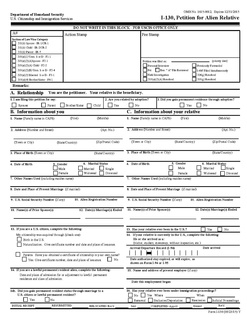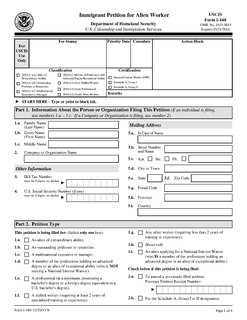Related Research Articles

A green card, known officially as a permanent resident card, is an identity document which shows that a person has permanent residency in the United States. Green card holders are formally known as lawful permanent residents (LPRs). As of 2019, there are an estimated 13.9 million green card holders of whom 9.1 million are eligible to become United States citizens. Approximately 65,000 of them serve in the U.S. Armed Forces.
An L-1 visa is a visa document used to enter the United States for the purpose of work in L-1 status. It is a non-immigrant visa, and is valid for a relatively short amount of time, from three months to five years, based on a reciprocity schedule. With extensions, the maximum stay is seven years.
A K-1 visa is a visa issued to the fiancé or fiancée of a United States citizen to enter the United States. A K-1 visa requires a foreigner to marry his or her U.S. citizen petitioner within 90 days of entry, or depart the United States. Once the couple marries, the foreign citizen can adjust status to become a lawful permanent resident of the United States. Although a K-1 visa is legally classified as a non-immigrant visa, it usually leads to important immigration benefits and is therefore often processed by the Immigrant Visa section of United States embassies and consulates worldwide.
U.S. Citizenship and Immigration Services (USCIS) is an agency of the United States Department of Homeland Security (DHS) that administers the country's naturalization and immigration system. It is a successor to the Immigration and Naturalization Service (INS), which was dissolved by the Homeland Security Act of 2002 and replaced by three components within the DHS: USCIS, Immigration and Customs Enforcement (ICE), and Customs and Border Protection (CBP).
The V visa is a temporary visa available to spouses and minor children of U.S. lawful permanent residents. It allows permanent residents to achieve family unity with their spouses and children while the immigration process takes its course. It was created by the Legal Immigration Family Equity Act of 2000. The Act is to relieve those who applied for immigrant visas on or before December 21, 2000. Practically, the V visa is currently not available to spouses and minor children of LPRs who have applied after December 21, 2000.
The E-2 Investor Visa allows an individual to enter and work inside of the United States based on an investment they will be controlling, while inside the United States. The E2 visa is good for three months to five years and can be extended indefinitely. The investment must be "substantial." Investor visas are available only to citizens of certain countries. E-2 visas are also available to non-investor employees of the business, as long as the persons are of the same nationality as the investor and are destined for a role in the US business that is either executive/supervisory or requires specialized skills that are essential to the efficient operation of the US enterprise.
A Request for Evidence (RFE) is a request issued by the United States Citizenship and Immigration Services to petitioners for residency, citizenship, family visas, and employment visas. Examples of petitions for which a RFE may be issued are Form I-129, Form I-140, and Form I-130.
An L-2 visa is a visa document used to enter the United States by the dependent spouse and unmarried children under 21 years of age of qualified L-1 visa holders. It is a non-immigrant visa, and is only valid for the duration of the spouse's L-1 visa.
EB-2 is an immigrant visa preference category for United States employment-based permanent residency, created by the Immigration Act of 1990. The category includes "members of the professions holding advanced degrees or their equivalent", and "individuals who because of their exceptional ability in the sciences, arts, or business will substantially benefit prospectively the national economy, cultural or educational interests, or welfare of the United States, and whose services in the sciences, arts, professions, or business are sought by an employer in the United States". Applicants must generally have an approved labor certification, a job offer, and their employer must have filed an Immigrant Petition for Alien Worker with the USCIS.
Premium Processing Service refers to an optional premium service offered by the United States Citizenship and Immigration Services to employers filing Form I-129 or Form I-140. To avail of the service, the employer needs to file Form I-907 and include a fee that is $1,440.
The United States Citizenship and Immigration Services (USCIS) issues a number of forms for people to submit to them relating to immigrant and non-immigrant visa statuses. These forms begin with the letter "I". None of the forms directly grants a United States visa, but approval of these forms may provide authorization for staying or extending one's stay in the United States as well as authorization for work. Some United States visas require an associated approved USCIS immigration form to be submitted as part of the application.

Form I-130, Petition for Alien Relative is a form submitted to the United States Citizenship and Immigration Services by a United States citizen or Lawful Permanent Resident petitioning for an immediate or close relative intending to immigrate to the United States. It is one of numerous USCIS immigration forms. As with all USCIS petitions, the person who submits the petition is called the petitioner and the relative on whose behalf the petition is made is called the beneficiary. The USCIS officer who evaluates the petition is called the adjudicator.
A Notice of Intent to Deny (NOID) is a notice issued by the United States Citizenship and Immigration Services to petitioners for residency, citizenship, family visas, and employment visas. Examples of petitions for which a NOID may be issued are Form I-129, Form I-140, and Form I-130.
Consular nonreviewability refers to the doctrine in immigration law in the United States where the visa decisions made by United States consular officers cannot be appealed in the United States judicial system. It is closely related to the plenary power doctrine that immunizes from judicial review the substantive immigration decisions of the United States Congress and the executive branch of the United States government.
A Notice of Intent to Revoke (NOIR) is a communication sent by the United States Citizenship and Immigration Services to a petitioner about a previously approved petition, telling him or her that the USCIS intends to revoke the petition, along with the reasons for revocation, and giving the petitioner a fixed amount of time to respond. NOIRs may be issued for immigrant visa petitions and for non-immigrant visa petitions.
The United States Citizenship and Immigration Services is a subdivision of the U.S. Department of Homeland Security that adjudicates petitions and processes forms related to citizenship, residency, and various kinds of authorization to live and work in the United States. Many of the forms it processes are prerequisites for people outside the United States who are not United States citizens or permanent residents to obtaining visas to enter the United States in the specified status. Many of the USCIS immigration forms have long processing times. The USCIS offers some guidance regarding expected processing times through its website and through reports. This page describes the USCIS policies, the guidance they offer, and the courses of action in case of higher processing times.
The National Visa Center (NVC) is a center that is part of the U.S. Department of State that plays the role of holding United States immigrant visa petitions approved by the United States Citizenship and Immigration Services until an immigrant visa number becomes available for the petition, at which point it arranges for the visa applicant(s) to take the visa interview at a consulate abroad. It is located in Portsmouth, New Hampshire. It was established on July 26, 1994 on the site of an Air Force base that was closed down by The Pentagon.
The Legal Immigration Family Equity Act of 2000, also known as the LIFE Act and as the Legal Immigration and Family Equity Act, along with its Amendments, made some changes to laws surrounding immigration for family members of United States citizens and Lawful Permanent Residents, as well as people eligible for employment-based immigrant visas, in the direction of making it easier for family members and immigrant workers to move to and adjust status within the United States. It was passed on December 21, 2000, as title XI of Pub.L. 106–553 (text)(pdf).
Special Immigrant Juvenile Status (SIJS) is a special way for minors currently in the United States to adjust status to that of Lawful Permanent Resident despite unauthorized entry or unlawful presence in the United States, that might usually make them inadmissible to the United States and create bars to Adjustment of Status. The key criterion for SIJS is abuse, neglect, or abandonment by one or both parents.

Form I-140, Immigrant Petition for Alien Worker is a form submitted to the United States Citizenship and Immigration Service (USCIS) by a prospective employer to petition an alien to work in the US on a permanent basis. This is done in the case when the worker is deemed extraordinary in some sense or when qualified workers do not exist in the US. The employer who files is called the petitioner, and the alien employee is called the beneficiary; these two can coincide in the case of a self-petitioner. The form is 6 pages long with a separate 10-page instructions document as of 2016. It is one of the USCIS immigration forms.
References
- 1 2 3 4 5 6 "Filing Immigrant Petitions Outside the United States". United States Department of State . Retrieved May 23, 2015.CS1 maint: discouraged parameter (link)
- ↑ "I-130 Processing". Embassy of the United States, New Delhi, India. Archived from the original on May 20, 2015. Retrieved May 23, 2015.CS1 maint: discouraged parameter (link)